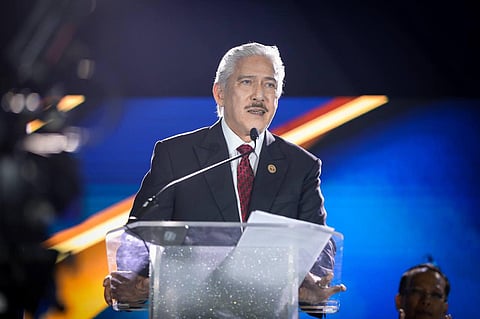
- NEWS
- the EDIT
- COMMENTARY
- BUSINESS
- LIFE
- SHOW
- ACTION
- GLOBAL GOALS
- SNAPS
- DYARYO TIRADA
- MORE

Several senators want the public to see exactly how the proposed P6.79-trillion national budget will be scrutinized — by livestreaming the deliberations so everyone can watch.
On Wednesday, Senate Minority Leader Vicente “Tito” Sotto III threw his full support behind Concurrent Joint Resolution No. 4 filed by Senator Sherwin Gatchalian and backed by several colleagues, which aims to make the budget process more transparent.
Sotto said the move aligns perfectly with Senate Joint Resolution No. 1, which he and five other senators filed earlier to push for greater transparency in bicameral conference committee meetings.
“To afford the public transparency and access to the budget process, the Senate and House of Representatives will ensure that digital livestreaming is available and readily accessible to the public in all budget deliberations,” Sotto said, adding that all budget deliberations could be viewed in real time and revisited at any time by anyone, thereby fostering greater accountability.
While pushing for openness, the Minority Leader stressed the need for caution in handling sensitive information.
He said that while the public may criticize and give feedback on the deliberations and proceedings, the inputs should be thoroughly screened and subjected to a strict vetting process to protect the integrity of the process.
Full transparency
Sotto’s fellow minority member, Senator Panfilo Lacson, backed the proposal to make the budget deliberations public, saying the most genuine transparency is full transparency.
He said this would make the proponents answerable for flood control and other infrastructure projects that turn out to be substandard or ghost projects.
He said Senate Concurrent Resolution No. 4, which was taken up in plenary on Tuesday, will not achieve its purpose of ensuring transparency in deliberations for the 2026 budget unless “the identities of individual proponents of amendments or insertions must also be made public, so they may be held accountable for substandard or ghost projects that they proposed in the crafting of the GAA,” he said in a post on X Wednesday.
“If we don’t have full transparency, I don’t want to say we’re just kidding each other, but we will not be fully transparent, and it will defeat the purpose of the resolution. We need to identify the proponents because that’s where the hiding of pork happens,” he said. “If we don’t trace amendments back to the proponents, this will allow questionable insertions all over again.”
Lacson raised the issue after learning from Gatchalian that not all the documents may be uploaded to the government’s website under the concurrent resolution.
Senator Loren Legarda, for her part, said the deliberations on the 2026 national budget should involve the public.
She said transparency should go hand in hand with public participation, which is why she highlighted the proposed People’s Participation in the National Budget Process Act that she and Lacson filed.
“This measure institutionalizes the role of civil society organizations (CSO) in the preparation and authorization of the national budget. It guarantees at least 30 percent representation by marginalized sectors, ensures access to agency performance data, and allows CSOs to provide policy critiques. These safeguards will give communities — especially those most affected by government spending — an active voice in how public funds are planned and allocated,” Legarda said.
Meanwhile, Senate President Francis “Chiz” Escudero, along with fellow senators, received a copy of the proposed P6.793-trillion National Expenditure Program from Budget Secretary Amenah Pangandaman on Wednesday.
The 2026 national budget marks a P466.84 billion increase, or 7.38 percent more than the 2025 enacted budget.
According to the Department of Budget and Management, the proposed spending level represents 22 percent of the country’s GDP. The government plans to continue prioritizing education, healthcare, and social protection, with an added emphasis on closing learning gaps and ensuring food security.
